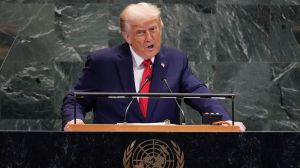Post-Budget rant: So what’s new about it all?
The annual media mela is on and the usual, as well as the ‘wannabe’, pundits have come to the party with their own collection of c...

The annual media mela is on and the usual, as well as the ‘wannabe’, pundits have come to the party with their own collection of cliches. There are two distinct camps, both diametrically opposed, yet both expressing their own misplaced convictions.
One camp seems to think that the Budget is a policy-making tool and therefore an occasion to push the reform agenda. Those who subscribe to this view are guilty of unrealistic expectations and repeatedly set themselves up for disappointment. Moreover, they cause successive finance ministers to intersperse urdu couplets with sweeping statements of intent which are of little value other than for creating a vague ‘feel good’ factor.
History should teach us that any Budget with that one so-called ‘big idea’ loses relevance with time, the singular exception being Manmohan Singh’s landmark first budget which kickstarted economic reforms. (After all, what is the legacy today of VP Singh’s ‘long-term fiscal policy’ or his ‘zero base budgeting’?)
There are, of course, the other set of pundits who think that sometimes the ‘big idea’ can be a prescription for disaster. This lot believes that the economy grows despite, and not because of government policy, and therefore prefer an FM who tends not to tinker too much. These are the pundits who are relieved to note that there are no new taxes, but fail to inquire why there is no overt effort to curb expenditure.
For both these camps, and the reader, here is some food for thought:
• The FM assures us that the Banking Cash Transaction Tax (BCTT) will continue only until the AIR system is up and running. We should be pleasantly surprised if and when the BCTT is discontinued. The surcharge on tax rates was also supposed to be temporary when it was imposed.
• While the revenue drive continues, we are supposed to celebrate the fact that the increase in non-plan expenditure is the smallest in recent years. And meanwhile, a beleaguered FM is left pleading to the house to arrive at a consensus on wasteful subsidies.
• In a high-growth economy there is always some rationale for the imposition of a tax on consumption. However, there is a huge difference between a tax on consumption and a tax on genuine business expenditure. Moreover, when the tax on business expenditure is presumptive of a benefit to employees of the business, then the results can be odious.
• Will we ever see a Budget which is just an exercise in balancing the books of the government rather than one more exercise in announcing schemes that are misconceived? For instance, does anyone really think that ‘‘viability gap funding’’ by IIFC will enable India to become a preferred destination for the manufacture of semi-conductors? The global semi-conductor manufacturers have set up shop in China only because they can move imports from ports to the workshop in a fraction of the time that it takes here.
Has it occurred to anyone yet that the above comments may be equally applicable to several past and possibly most future Budgets?
(The author is a senior corporate lawyer)
Photos



- 01
- 02
- 03
- 04
- 05




























